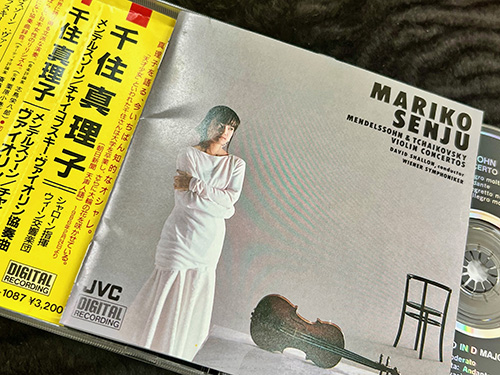
(April,1986 release)
My very first recording was in the winter when I was 23. The recording session took place in the Vienna Konzerthaus, a hall where I dreamed of, with the Wiener Symphoniker, conducted by Mr. David Shallon.
The programme was the two great violin concertos of Mendelssohn and Tchaikovsky.
The fact that recordings would remain semi-permanently, came up again and again during conversations in various interviews and meetings.
Together with the joy of them remaining, the thought of the sound you make instantly will remain almost forever was firmly embedded into my mind and I also began to feel the fear.
It can be said that recordings are the exact opposite of concerts.
In concerts, the sound is born from the intertwining of various conditions of the performers of the day, the hall, the audience, and of course my own condition as well as my instrument, from which the performance develops that can only be heard at that moment of the concert.
Performing on stage can be exciting because you don’t know what is going to happen.
However, recordings are different.
The sound made at that moment remains.
The pressure of the bow, the amount of vibrato, the way the emotions rise and fall, and even the sound that you made without thinking, will remain forever.
I stood in front of an orchestra at my first recording, when the recording director gave me instructions through the small speakers in front of me saying “Mariko-chan, it’s time to start now. Take it easy!”
It’s difficult taking it easy……because even the first note sounds something different from what I wanted it to sound like, and I started again.
What kind of sound or tone do I want to make? A sound that unfolds the situation at the moment it is played. A sound that starts a story of that piece. A gentle tone that can touch the heart of the listener, an emotional sound that can move their hearts.
I want to produce that kind of a sound.
I felt despair, feeling that I was still not a performer who could produce the sound that I wanted.
Now, some 40 years later, I will be celebrating my 50th debut anniversary next year.
My recording for the 50th anniversary is a concerto album with the same coupling as my debut recording, of Mendelssohn and Tchaikovsky. I could not think of any other repertoire than these two great concertos.
I am not the same 23-year-old violinist.
I have a tone that I want to produce.
I have studied the technique and the state of mind to produce that tone.
Thoughts that I want to convey conjure up.
I have a message that I want to leave behind.
And finally, I had a great group of companions joining me to freeze the voice of my Duranty
of the moment into the future.
I recorded with the members of the Japan Philharmonic Orchestra, conducted by Mr. Chikara Iwamura.
With the companions with whom I have performed many, many times, and whom I can trust wholeheartedly, the recording went considerably better than expected, and I was able to fully capture the sound of the Stradivarius Duranty in the way I play it today.
I have, of course, recorded almost every year during the last 40 years, and have made CDs of various concertos, sonatas, and many masterpieces of miniature pieces.
I have become very fond of recordings during the process.
The joy of being able to freeze a thought, the time, the air, and the sound in an instant, simply by unleashing my spirit of the moment in the purest form.
I save up and store my passion for the music to the full, and let Duranty sing the energy that comes from the bottom of my heart. My beloved instrument sang a brilliant song of nostalgic and warm elegy. I can’t wait for this sound to be released, to reach your hands and beyond.